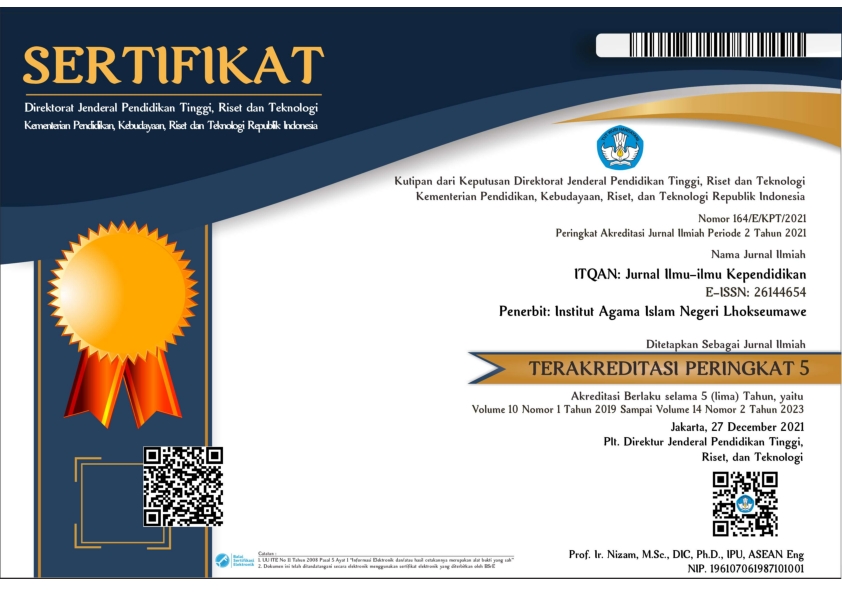Optimasi Peran Guru Pendidikan Agama Islam dalam Pembelajaran Fikih: Dampaknya terhadap Pemahaman Agama
Main Article Content
Titi Kadi
This article discusses the role of Islamic Religious Education teachers in deepening the study of Fiqh (Islamic jurisprudence) in junior high schools, with a focus on the methods they employ and their impact on students, as well as the implications for religious understanding and character development. The research utilizes a qualitative approach with data collection techniques including interviews, observations, and document analysis. The data is analyzed through data condensation, data presentation, and verification/conclusion stages. The research findings reveal the following: The role of PAI teachers includes acting as discussion facilitators, guiding students in case studies, and organizing simulations of religious worship and transactions. PAI teachers' efforts in teaching involve encouraging students to ask questions and engage in discussions on complex Fiqh matters, conducting practical activities such as group discussions, case studies, and religious worship simulations. The impact of PAI teachers' role in deepening Fiqh studies helps students attain a deeper understanding of Islam, enhances moral awareness, improves decision-making abilities, and fosters critical thinking skills. Implications of the role of PAI teachers in Fiqh education include the enhancement of religious understanding within society, the development of improved skills in interpreting Islamic law, the potential for ethical and responsible leadership, and the promotion of intercultural dialogue and religious tolerance. The implications of this study underscore the significance of effective PAI teachers in shaping a more knowledgeable, ethical, and value-committed younger generation.
Bashori, B., Novebri, N., & Salabi, A. S. (2022). Budaya Pesantren: Pengembangan Pembelajaran Turats. Al Mabhats: Jurnal Penelitian Sosial Agama, 7(1), 67–83. https://journal.iainlhokseumawe.ac.id/index.php/AlMabhats/article/view/911.
Duryat, H. M. (2021). Paradigma Pendidikan Islam: Upaya Penguatan Pendidikan Agama Islam di Institusi yang Bermutu dan Berdaya Saing. Penerbit Alfabeta.
Fadhla, A. (2023). Upaya Peningkatan Hasil Belajar Fiqih dengan Menggunakan Metode Picture and Picture pada Siswa Kelas V MIN 20 Bireuen. AHDAF: Jurnal Pendidikan Agama Islam, 1(1), 23–33. https://journal.iainlhokseumawe.ac.id/index.php/AHDAF/article/view/855.
Giyarsi, G. (2020). Strategi Alternatif dalam Pembelajaran Daring Pendidikan Agama Islam Pada Masa Pandemi Covid 19. GHAITSA: Islamic Education Journal, 1(3), 224–244. https://www.siducat.org/index.php/ghaitsa/article/view/108.
Hambali, M. (2016). Manajemen Pengembangan Kompetensi Guru PAI. J-MPI (Jurnal Manajemen Pendidikan Islam), 1(1). https://doi.org/10.18860/jmpi.v1i1.3229.
Ishaac, M. (2020). Pengembangan Model-Model Pembelajaran Pendidikan Agama Islam. Guepedia.
Jalaludin, J., & Ilahiyah, I. I. (2023). Implementasi Metode Poblem Based Learning dalam Pembelajaran Fiqih MA Al-Asy’ari Keras Diwek Jombang. Humantech: Jurnal Ilmiah Multidisiplin Indonesia, 2(11), 2412–2422. http://www.journal.ikopin.ac.id/index.php/humantech/article/view/3568.
Mahfudh, S. (2011). Nuansa Fiqh Sosial (7th ed.). LKis.
Mansir, F. (2020). Urgensi Pembelajaran Fiqih dalam Meningkatkan Religiusitas Siswa Madrasah. AL-WIJDÃN Journal of Islamic Education Studies, 5(2), 167–179. https://doi.org/10.58788/alwijdn.v5i2.538.
Miles, M.B, Huberman, A.M, dan S. J. (2014). Qualitative Data Analysis: A Methods Sourcebook (3rd ed.). Sage Publications.
Mudawam, S. (2012). Syari’ah-Fiqih-Hukum Islam: Studi tentang Konstruksi Pemikiran Kontemporer. Asy-Syir’ah: Jurnal Ilmu Syari’ah dan Hukum, 46(2), 402–450. https://asy-syirah.uin-suka.com/index.php/AS/article/view/45.
Nurhasanah, N., Hayatuddin, A., & Hidayat, Y. R. (2018). Metodologi Studi Islam. Amzah.
Saleh, M. (2013). Strategi Pembelajaran Fiqh dengan Problem-Based Learning. Jurnal Ilmiah Didaktika, 14(1). https://doi.org/10.22373/jid.v14i1.497.
Sugiyono. (2020). Metode Penelitian Kualitatif. Alfabeta.
Sultani, S., Alfitri, A., & Noorhaidi, N. (2023). Teori Belajar Humanistik dan Penerapannya dalam Pembelajaran Pendidikan Agama Islam. ANSIRU PAI: Pengembangan Profesi Guru Pendidikan Agama Islam, 7(1), 177. https://doi.org/10.30821/ansiru.v7i1.16108.
Suryanti, S. (2019). Penerapan Metode Diskusi untuk Meningkatkan Kognitif Siswa Kelas VII SMPN 7 Kuntodarusalam. Perspektif Pendidikan dan Keguruan, 10(1), 27–37. https://doi.org/10.25299/perspektif.2019.vol10(1).3095.
Sutiah. (2016). Teori Belajar dan Pembelajaran. Nizamiah Learning Center.
Tanjung, S., Arwan, Z., & Zahiruddin, Z. (2018). Inovasi dalam Kurikulum Pendidikan Islam di MIS Raudhatul Multazam Kuta Buluh Kabupaten Karo. ITTIHAD, 2(2). http://ejournal-ittihad.alittihadiyahsumut.or.id/index.php/ittihad/article/view/51.
Taruna, M. M. (2011). Kompetensi Guru Pendidikan Agama Islam. Analisa, 18(2), 180. https://journal.blasemarang.id/index.php/analisa/index.
Yazid, I., Azizah, S. M., & Wahyuni, F. (2023). Peningkatan Pembelajaran Fiqh dengan Metode Demonstrasi. AL-MIKRAJ: Jurnal Studi Islam dan Humaniora, 3(2), 55–61. https://ejournal.insuriponorogo.ac.id/index.php/almikraj/article/view/2598.
Zulhamdi, Z. (2018). Kedudukan Fiqhdi Indonesia Pasca Kemerdekaan. At-Tafkir, 11(1), 1–30. https://doi.org/10.32505/at.v11i1.526.




